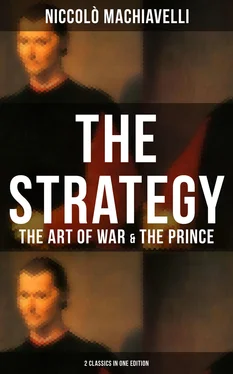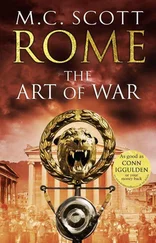Niccolò Machiavelli
THE STRATEGY: The Art of War & The Prince
(2 Classics in One Edition)
Published by

Books
- Advanced Digital Solutions & High-Quality eBook Formatting -
musaicumbooks@okpublishing.info
2017 OK Publishing
ISBN 978-80-272-1858-5
The Prince
Dedication: To the Magnificent Lorenzo Di Piero De’ Medici
Chapter 1 - Of the Various Kinds of Princedom, and of the Ways in Which They Are Acquired
Chapter 2 - Of Hereditary Princedoms
Chapter 3 - Of Mixed Princedoms
Chapter 4 - Why the Kingdom of Darius, Conquered by Alexander, Did Not, on Alexander’s Death, Rebel Against His Successors
Chapter 5 - How Cities or Provinces Which Before Their Acquisition Have Lived Under Their Own Laws Are To Be Governed
Chapter 6 - Of New Princedoms Which a Prince Acquires With His Own Arms and by Merit
Chapter 7 - Of New Princedoms Acquired By the Aid of Others and By Good Fortune
Chapter 8 - Of Those Who By Their Crimes Come to Be Princes
Chapter - 9 Of the Civil Princedom
Chapter - 10 How the Strength of All Princedoms Should Be Measured
Chapter 11 - Of Ecclesiastical Princedoms
Chapter 12 - How Many Different Kinds of Soldiers There Are, and of Mercenaries
Chapter 13 - Of Auxiliary, Mixed, and National Arms
Chapter 14 - Of the Duty of a Prince In Respect of Military Affairs
Chapter 15 - Of the Qualities In Respect of Which Men, and Most of all Princes, Are Praised or Blamed
Chapter 16 - Of Liberality and Miserliness
Chapter 17 - Of Cruelty and Clemency, and Whether It Is Better To Be Loved or Feared
Chapter 18 - How Princes Should Keep Faith
Chapter 19 - That a Prince Should Seek to Escape Contempt and Hatred
Chapter 20 - Whether Fortresses, and Certain Other Expedients to Which Princes Often Have Recourse, are Profitable or Hurtful
Chapter 21 - How a Prince Should Bear Himself So As to Acquire Reputation
Chapter 22 - Of the Secretaries of Princes
Chapter 23 - That Flatterers Should Be Shunned
Chapter 24 - Why the Princes of Italy Have Lost Their States
Chapter 25 - What Fortune Can Effect in Human Affairs, and How She May Be Withstood
Chapter 26 - An Exhortation to Liberate Italy from the Barbarians
The Art of War
PREFACE
Book 1
Book 2
Book 3
Book 4
Book 5
Book 6
Book 7
Table of Contents
Dedication: To the Magnificent Lorenzo Di Piero De’ Medici
Chapter 1 - Of the Various Kinds of Princedom, and of the Ways in Which They Are Acquired
Chapter 2 - Of Hereditary Princedoms
Chapter 3 - Of Mixed Princedoms
Chapter 4 - Why the Kingdom of Darius, Conquered by Alexander, Did Not, on Alexander’s Death, Rebel Against His Successors
Chapter 5 - How Cities or Provinces Which Before Their Acquisition Have Lived Under Their Own Laws Are To Be Governed
Chapter 6 - Of New Princedoms Which a Prince Acquires With His Own Arms and by Merit
Chapter 7 - Of New Princedoms Acquired By the Aid of Others and By Good Fortune
Chapter 8 - Of Those Who By Their Crimes Come to Be Princes
Chapter - 9 Of the Civil Princedom
Chapter - 10 How the Strength of All Princedoms Should Be Measured
Chapter 11 - Of Ecclesiastical Princedoms
Chapter 12 - How Many Different Kinds of Soldiers There Are, and of Mercenaries
Chapter 13 - Of Auxiliary, Mixed, and National Arms
Chapter 14 - Of the Duty of a Prince In Respect of Military Affairs
Chapter 15 - Of the Qualities In Respect of Which Men, and Most of all Princes, Are Praised or Blamed
Chapter 16 - Of Liberality and Miserliness
Chapter 17 - Of Cruelty and Clemency, and Whether It Is Better To Be Loved or Feared
Chapter 18 - How Princes Should Keep Faith
Chapter 19 - That a Prince Should Seek to Escape Contempt and Hatred
Chapter 20 - Whether Fortresses, and Certain Other Expedients to Which Princes Often Have Recourse, are Profitable or Hurtful
Chapter 21 - How a Prince Should Bear Himself So As to Acquire Reputation
Chapter 22 - Of the Secretaries of Princes
Chapter 23 - That Flatterers Should Be Shunned
Chapter 24 - Why the Princes of Italy Have Lost Their States
Chapter 25 - What Fortune Can Effect in Human Affairs, and How She May Be Withstood Chapter 26 - An Exhortation to Liberate Italy from the Barbarians
Dedication: To the Magnificent Lorenzo Di Piero De’ Medici
It is customary for such as seek a Prince’s favour, to present themselves before him with those things of theirs which they themselves most value, or in which they perceive him chiefly to delight. Accordingly, we often see horses, armour, cloth of gold, precious stones, and the like costly gifts, offered to Princes as worthy of their greatness. Desiring in like manner to approach your Magnificence with some token of my devotion, I have found among my possessions none that I so much prize and esteem as a knowledge of the actions of great men, acquired in the course of a long experience of modern affairs and a continual study of antiquity. Which knowledge most carefully and patiently pondered over and sifted by me, and now reduced into this little book, I send to your Magnificence. And though I deem the work unworthy of your greatness, yet am I bold enough to hope that your courtesy will dispose you to accept it, considering that I can offer you no better gift than the means of mastering in a very brief time, all that in the course of so many years, and at the cost of so many hardships and dangers, I have learned, and know.
This work I have not adorned or amplified with rounded periods, swelling and high-flown language, or any other of those extrinsic attractions and allurements wherewith many authors are wont to set off and grace their writings; since it is my desire that it should either pass wholly unhonoured, or that the truth of its matter and the importance of its subject should alone recommend it.
Nor would I have it thought presumption that a person of very mean and humble station should venture to discourse and lay down rules concerning the government of Princes. For as those who make maps of countries place themselves low down in the plains to study the character of mountains and elevated lands, and place themselves high up on the mountains to get a better view of the plains, so in like manner to understand the People a man should be a Prince, and to have a clear notion of Princes he should belong to the People.
Let your Magnificence, then, accept this little gift in the spirit in which I offer it; wherein, if you diligently read and study it, you will recognize my extreme desire that you should attain to that eminence which Fortune and your own merits promise you. Should you from the height of your greatness some time turn your eyes to these humble regions, you will become aware how undeservedly I have to endure the keen and unremitting malignity of Fortune.
Niccolo Machiavelli
Chapter 1 - Of the Various Kinds of Princedom, and of the Ways in Which They Are Acquired
All the States and Governments by which men are or ever have been ruled, have been and are either Republics or Princedoms. Princedoms are either hereditary, in which the sovereignty is derived through an ancient line of ancestors, or they are new. New Princedoms are either wholly new, as that of Milan to Francesco Sforza; or they are like limbs joined on to the hereditary possessions of the Prince who acquires them, as the Kingdom of Naples to the dominions of the King of Spain. The States thus acquired have either been used to live under a Prince or have been free; and he who acquires them does so either by his own arms or by the arms of others, and either by good fortune or by merit.
Читать дальше













